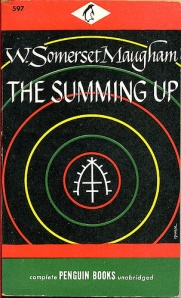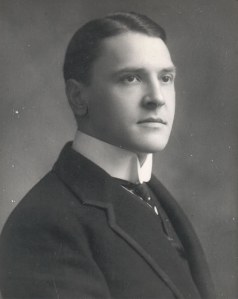“The Summing Up” by W. Somerset Maugham (1938) – 310 pages
“Perfection is a trifle dull. It is not the least of life’s ironies that this, which we all aim at, is better not quite achieved.”
As a writer, W. Somerset Maugham was supremely competent. “Competent” was the word that the critics of his time used to dismiss his work. Maugham himself considered his work “in the very top rank of the second rate”. Maugham valued Shakespeare, Cervantes, Tolstoy, and a few other writers as first rate, so there was really little shame involved in being second rate.
I’ve read my share of Maugham’s work including his excellent early novels ‘Cakes and Ale’ and ‘The Painted Veil’ as well as his later novels ‘The Razor’s Edge’ and ‘Of Human Bondage’. It is probably his stories that I’ve most enjoyed and appreciated, especially his tales of the Far East.
As a young man, Maugham trained as a doctor. I’m sure he was competent in the medical field as he was in all the fields he pursued, but in ‘The Summing Up’ he talks about working as a doctor during the day and then staying up all night reading the great works of literature. I’m not sure I would have wanted him as my doctor under these circumstances. His work in the medical field spurred his empathy for people in extreme circumstances which he used to great effect later in his writing career.
Next he became a playwright. In the early 1900s he was the toast of the West End theatre district of London; at one point he had four hit plays performing simultaneously. However he gave up the glamor and the glory of the theatre life, because plays were collaborations between the playwright, the director, and the actors. Apparently there were one too many times when his play got changed in ways he didn’t want, so he became a fiction writer where he alone had total sole control over what he wrote.
In “The Summing Up”, Maugham shares many of his insights into the life of a writer. Here is one of the best objective evaluations of a writer I’ve ever seen, and Maugham wrote it about himself.
“I discovered my limitations and it seemed to me that the only sensible thing was to aim at what excellence I could within them. I knew that I had no lyrical quality, I had a small vocabulary and no efforts that I could make to enlarge it much, availed me. I had little gift of metaphor; the original and striking simile seldom occurred to me. Poetic flights and the great imaginative sweep were beyond my powers. I could admire them in others as I could admire their far-fetched tropes and the unusual but suggestive language in which they clothed their thoughts, but my own invention never presented me with such embellishments; and I was tired of trying to do what did not come easily to me.
On the other hand, I had an acute power of observation and it seemed to me that I could see a great many things that other people missed. I could put down in clear terms what I saw. I had a logical sense, and if no great feeling for the richness and strangeness of words, at all events a lively appreciation of their sounds. I knew that I should never write as well as I could wish, but I thought with pains I could arrive at writing as well as my natural defects allowed. On taking thought it seemed to me that I must aim at lucidity, simplicity and euphony. I have put these three qualities in the order of the importance I assigned to them.”
 The first two-thirds of “The Summing Up” were an enjoyable and beneficial read for me. However Maugham had a life-long interest in philosophy, and in the last third of the book he discusses his philosophical influences and his own views on these matters. He lost me there. To me it sounded like blathering on about abstract concepts, and I missed the down to earth quality of the first part of the book.
The first two-thirds of “The Summing Up” were an enjoyable and beneficial read for me. However Maugham had a life-long interest in philosophy, and in the last third of the book he discusses his philosophical influences and his own views on these matters. He lost me there. To me it sounded like blathering on about abstract concepts, and I missed the down to earth quality of the first part of the book.
So what is W. Somerset Maugham’s standing as of today? Very well, thank you. Three of his novels have been made into movies during the 2000s : “Up at the Villa” (2000), “Being Julia” (2004 – based on the novel “Theatre”), and “The Painted Veil (2006). And there is always someone threatening to remake into a movie his classic short story “Rain” Wikipedia lists a total of 35 film adaptations of Maugham’s fiction over the years. Not bad for a writer who was only competent and second rate.

Posted by Alexander on January 22, 2015 at 4:00 PM
This phrase – “in the very top rank of the second rate” – is this quotation from “The Summing Up”? If yes, would you please give the exact chapter?
LikeLike
Posted by Anokatony on January 22, 2015 at 4:21 PM
Hi Alexander,
I wasn’t able to verify where the line “in the very top rank of the second rate” came from even though it is mentioned in several W. Sommerset Maugham articles on the Internet. Sorry.
LikeLike